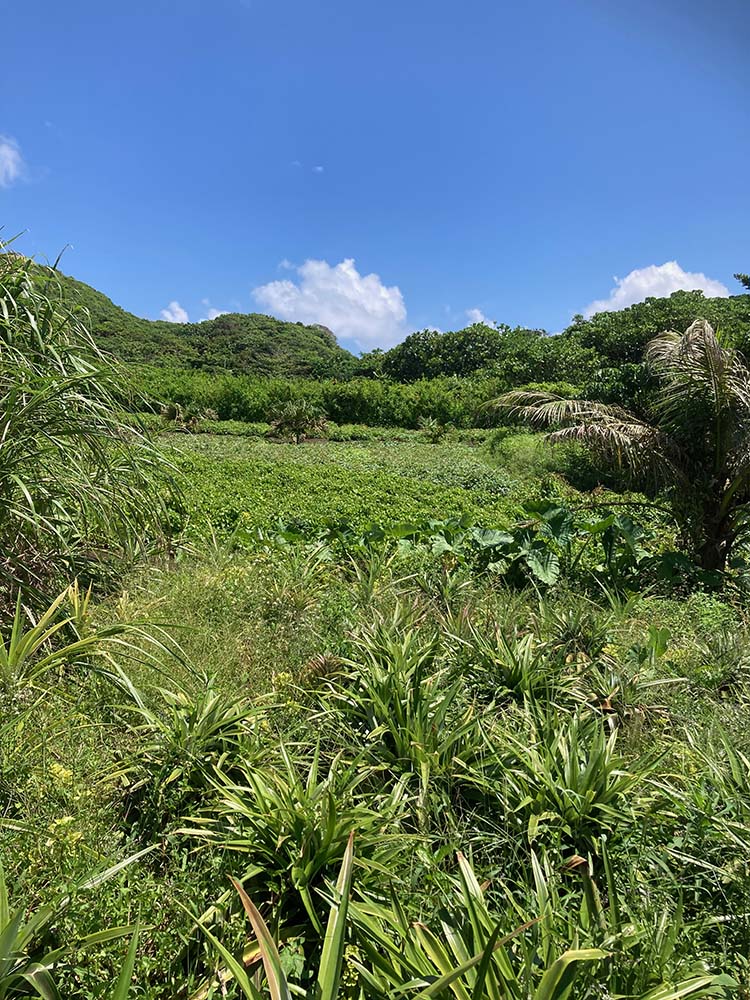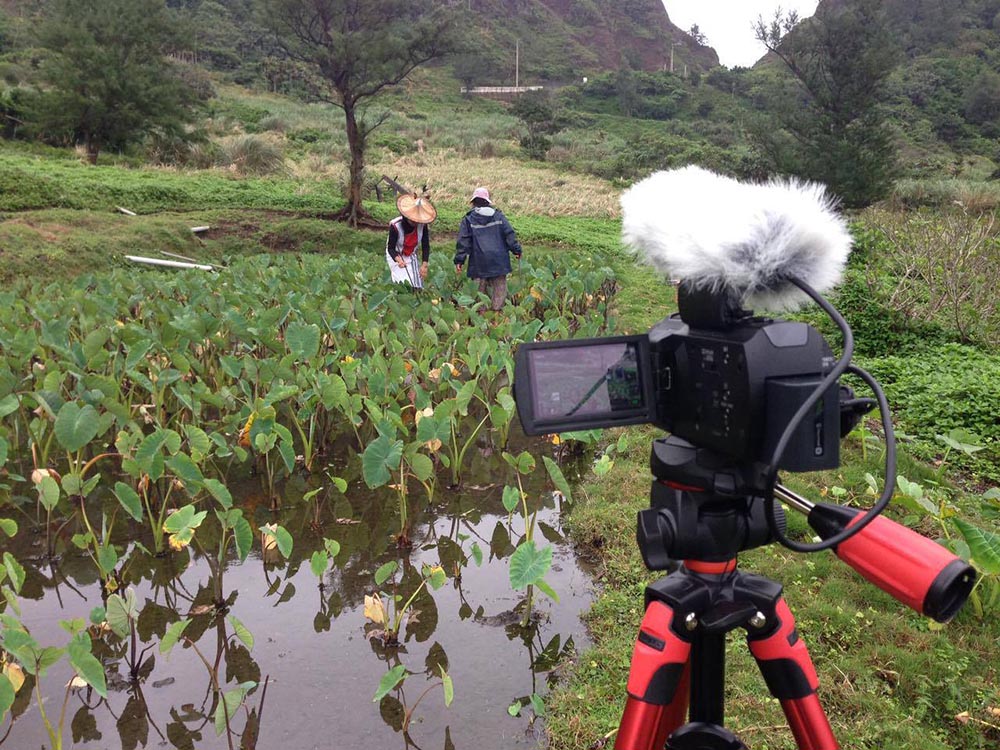"Matarek So Vahey" – New Family
Traditional Tau society is patrilocal and egalitarian. Men and women have a strict division of labour: women’s place is the land, the taro fields, and men’s place is the ocean. This changes as money, capitalism, and tourism infiltrate the everyday life of Tau families. Caring for fields and plants is strenuous and fills much of a Tau woman’s day. So does juggling the two identities of being Tau and Taiwanese, manifested in two names.
In traditional Tau social concepts, the family is the most important social unit. When a new family is formed, the woman joins her husband’s family and they establish a new home – matarek so vahey. Couples have a close relationship and, within a clear division of labor, are supportive of each other. In daily life and in ceremonial rituals Tau culture emphasizes a sense of oneness between husband and wife.
Seven years ago, I interviewed my mother while filming a documentary about the making of a matarek so vahey. She told me: “After a man and a woman formally become husband and wife, they begin to organize a family by finding land to cultivate and plant crops. After planting sweet potato, they plant yams, and after planting yams, they plant taro. According to traditional Tau custom, they form a matarek so vahey, a new family, a new home. Men learn to build boats and go fishing, while women practice taro planting and learn the traditional art of weaving.”
It is commonly said of the gender division of labor between Tau men and women that the sea is the field of men, while the field is the sea of women. In reality it is not entirely that simple. Women do not touch boats during flying fish season, but during the rest of the year they may approach the boats of the family in connection with activities at the beach. Likewise, while women are responsible for planting, harvesting, and maintaining the fields, men are often included in other sorts of field-related work, such as clearing new fields and building irrigation ditches and channels.
Women are not allowed to attend funerals or approach burial grounds, which are often in rugged terrain with cliffs and dense vegetation. Such taboos are not established through any decision, but rather reflect a set of life attitudes – and perhaps risk management, as, for instance, when women stay away from the ocean and cliffs – passed down through the generations in deep cultural layers.

Fig. 2: Fields for dry cultivation.
While establishing our family, my husband and I made serious efforts to live as Tau, to learn and practice Tau culture. My mother said, “Now that you have established a family, you can’t ask your mother and father to bring you taro every time there is a traditional celebration. Don’t you have hands and feet?” This made a deep impression on me. I realized that this is a crucial matter. I am no longer a little girl. I have a family, a husband, and two children. Animated by my mother’s words, my husband and I picked up hoes, cameras, and tripods, and we went to the mountains to cultivate the land and document the process.
Cultivation is a long and arduous process. In order to turn natural land into a taro field, we first cleared away all the vegetation with our bare hands, mounded up the soil, and drew in water from the mountain to irrigate the field. As an inexperienced couple, it took two months until the first taro seedling was planted.
Our work caring for the taro had only just begun. We had to regularly inspect the fields, weed, and check the water level. One year later, the taro that we had worked so hard to cultivate was eaten up by wild boar. Not a single root was left for us. But we did not give up on growing taro. We remained hopeful to eat the fruits of our hard work during the next flying fish season.
Although I have worked very hard to document and preserve the island’s living culture and to remember the traditional wisdom of Tau women, it is clear that in the face of the rapid changes of the times, our traditions are no longer all there is to life. The people of Pongso no Tau can no longer afford to ignore the value of money. In order to support their families, younger generations are caught between traditional culture and the ‘realities’ of life, with money consistently in conflict with traditional Tau life, especially the traditional rituals of the Tau seasonal calendar. During the long flying fish season each year (February to September), ever fewer young people return from the Big Island (Taiwan) to participate in traditional ceremonies.
With capitalism comes tourism, and our young people now prefer to engage in the tourism business. The younger generations have lost much of the knowledge underlying the rituals, and many of the rituals have become simplified as they approach the brink of extinction. This breach in cultural continuity deeply concerns me.

Fig. 3: Sinan Yongala and her
mother at work in the field.
How well do I know my home? My culture? I have been pondering these questions over and over since I was a young girl, and my ponderings have only intensified with bearing and rearing children. With the growing impacts of Taiwanese culture on island life and the cycle of traditional Tau rituals, I believe that without our cultural roots as source of nourishment, as bedrock foundation, we face immense challenges.
In order to not become an outsider in my native place, I struggle with my two identities as Xie Fumei and Sinan Yongala. Xie Fumei is my official name, forced on me by the Taiwanese government, for use in formal documents and Taiwanese contexts. It has no other connection or meaning to my life. Sinan Yongala, on the other hand, means mother of Yongala, which means ‘blessing’ and is the name of my eldest child. His name is Si Yongala, like my name was Si Namot – namot means diligent – until I became a mother. When Si Yongala someday becomes a father, his name will change to Syaman Name-of-child, and my name again changes, this time to Syapen Name-of-grandchild, and I will share that name with my husband. Such a beautiful naming culture!
With my two identities and two names, I balance on the edge between two societies, two cultures, two lives: Tau traditional life and Taiwanese-influenced modern life. As a mother, householder, and writer, I continuously struggle to affirm and nurture my Indigenous culture, while coping with contemporary conditions of life on our island.
Sinan Yongala is a resident of Iranmeylek and has been a passionate writer and photographer since attending Lanyu Junior High School. After higher education in Taiwan from age 15, she returned in her 20s when the Lan-An Cultural and Educational Foundation offered her a position to develop her interests. For over two decades, she served as a dedicated journalist for the Lanyu Bi-Weekly Journal. Through her eloquent reporting and captivating documentary films, she meticulously documented the significant transformations unfolding on Orchid Island. Email: sinamot@gmail.com